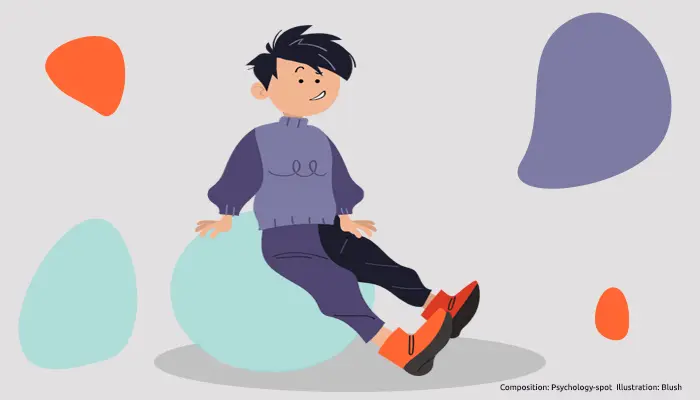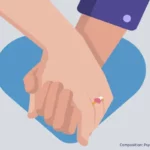
Do you have a girlfriend or a boyfriend?
It seems like an innocent question, if it weren’t for the fact that it is directed at a little boy or a little girl. It can arise in all types of contexts or come out of the mouth of anyone, whether it is a grandfather at a family dinner or the mother of another child while the little ones are playing in the park. However, although it seems like a banal question, one of those questions that is asked out of habit, it is actually not so harmless.
Obviously, we are all aware that a little child cannot maintain a relationship, but despite this, we ask the question. The child responds with the first thing that crosses his mind – without being fully aware of what he is saying. But the seed is planted and he’s probably going to start questioning some things or start seeing his relationships in a different light.
The unnecessary hypersexualization of childhood
Questions about gender or sexuality should not be a taboo topic with our children. But it is important to adapt the amount of information offered to their age, level of understanding and natural interests. And, above all, it is essential to address these issues without stereotypes since our attitudes can leave a fairly deep mark that accompanies them for much of their lives.
In general sense, children begin to distinguish gender around 3 or 4 years old, but they do not usually transfer these differences to their way of relating and, if they do, it is usually because they imitate adults or they push them in some way. Young children do not know the meaning of attraction or falling in love, they only think about playing, experimenting and discovering the world.
In fact, when children use the word “boyfriend” or “girlfriend” they generally refer to a special friend with whom they share interests, games and laughter. And they use that word because adults have used it before to indicate that girl or boy with whom they have a closer bond.
A 4 or 6 year old child might be able to explain what a boyfriend or girlfriend is, but they don’t really understand what it means. For this reason, when an adult uses the term boyfriend or girlfriend to refer to a good friend, it generates confusion in a child who is still exploring his or her emotional universe, learning to identify his or her emotions and those of others, trying to find meaning in them.
Of course, I am aware that the question “do you have a girlfriend?” it is usually an attempt by adults to engage children in conversation. They generally do it with good intentions, simply out of habit – perhaps because they also have been asked themselves this question at the time. However, asking a boy or girl if they have a boyfriend or girlfriend implies – in a certain way – sexualizing childhood because desires, ideas and intentions are attributed to them that children do not have.
If we ask a child who his girlfriend is or who he likes, we are normalizing that at their age they can have a close friend, which encourages childhood hypersexualization. In this way, without realizing it, we can accelerate behaviors that are not typical of childhood but that we approve with our comments and laughter.
Although it is not our intention, with that question we encourage children to resemble adults and assume roles that do not correspond to their stage of development. We encourage them to burn stages. However, at a young age, boys and girls just want to play, have fun, and explore without labels that limit them.
We can not be friends?
The question: “Do you have a girlfriend?” it also represents the first heteronormative expectations to which children are exposed. That is, adults assume that if it’s a boy, he’ll like girls – and vice versa. This is how gender indoctrination begins, which often prevents children from exploring their identity. That question begins to pigeonhole children into gender roles, when in reality we should all understand that we are people, simply, without more adjectives.
It also begins to convey to them an even more archaic idea: that men and women cannot maintain a close friendship. As adults, with our comments we approve or disapprove the relationships that children have with their peers, so we end up conditioning them.
This is how we begin to influence the way boys and girls relate to each other. The little ones, who at first do not attribute their relationships with others to anything other than friendship, learn that those whom they considered their playmates are actually divided into two categories: their friends and their potential partners.
In fact, older children – around 8 years old – may even begin to avoid having friends of the opposite gender to avoid humorous comments from others and not feel embarrassed. For this reason, when we ask boys or girls if they have a girlfriend or boyfriend, in a certain way we are telling them that there is a different way of behaving depending on who they are with, so in the end we encourage a change in the way they relate to their friends.
In short, although behind the question “Do you have a girlfriend?” hides the best of intentions, the truth is that adults should encourage friendly relationships between children. Nothing more, nothing less. Interpreting children’s social behaviors, such as sharing time and games, as dating relationships creates differences between them, confuses their emotional learning and can distance them from those friends with whom they share more interests and preferences simply because they are of the opposite gender.
Therefore, the next time you want to start a conversation with a child and be friendly, try a little harder to break the ice and don’t resort to these types of clichés. Not only are they tasteless and meaningless, but their implications on child development can be enormous.




Leave a Reply